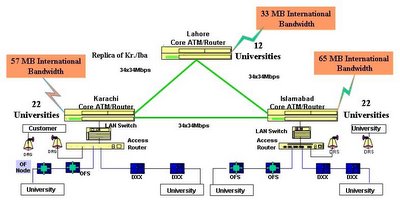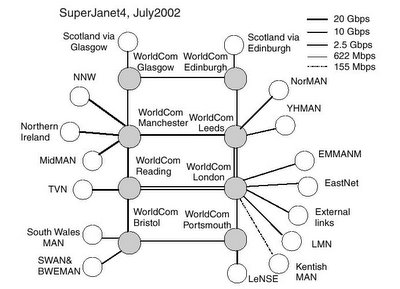Even though the networking requirement of most real grid applications are much more than provided by PERN, a developing country like Pakistan can not afford to have another dedicated high-speed network. So, PERN would be our starting point to any real grid computing implementation in Pakistan.
PERN utilizes the existing Optical Fiber System (OFS) of Pakistan Telecommunication Private Limited (PTCL) and National Telecommunication Limited (NTC) and IP/ATM backbone of NTC is utilized for the core network of PERN. The network design of PERN consists of three nodal points at Islamabad, Lahore and Karachi as shown in figure below. Most educational institutions are connected to their respective nodal point by a 256 Kb/s to 6Mbps link from the nearest exchange of NTC/PTCL using OFS, DXX, DRS or VSAT, whichever is technically feasible.

According to PERN website, the current interconnection of three main nodes is on 34x34 Mbps and Internet connectivity is 65 Mbps for Islamabad, 33 Mbps for Lahore and 57 Mbps for Karachi. This architecture allows institutions to pool resources with each other through national fiber network and to access Internet from the respective nodal points. The bandwidths provisioned and planned through the PERN network for various universities can be found on PERN website.
In order to elaborate the differences between PERN and similar networks of developed countries, the following is the architecture of the United Kingdom National Backbone Research and Education Network (see the figure below). The figure especially shows differences in speed and reliability of the two networks.

Comments on the design, performance and architecture of PERN are welcome as I am in the process of collecting and consolidating views from the industry people on this topic.
No comments:
Post a Comment